

Improve Mental Focus with ADD/ADHD Using These Exercises - Healing.Answers.com. Critical Thinking in Everyday Life: 9 Strategies. Most of us are not what we could be.
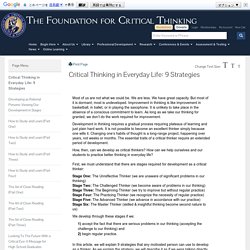
We are less. We have great capacity. But most of it is dormant; most is undeveloped. Improvement in thinking is like improvement in basketball, in ballet, or in playing the saxophone. It is unlikely to take place in the absence of a conscious commitment to learn. Development in thinking requires a gradual process requiring plateaus of learning and just plain hard work. How, then, can we develop as critical thinkers? First, we must understand that there are stages required for development as a critical thinker: We develop through these stages if we: In this article, we will explain 9 strategies that any motivated person can use to develop as a thinker. There is nothing magical about our ideas. First Strategy: Use “Wasted” Time. The key is that the time is “gone” even though, if we had thought about it and considered our options, we would never have deliberately spent our time in the way we did. When did I do my worst thinking today?
5 Simple Concentration Building Techniques for Kids with ADHD. Imagine that you are living inside of a video game, where everything is coming at you at once and every sight, sound and sensation is a distraction.
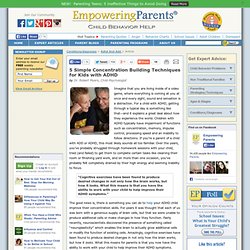
For a child with ADHD, getting through a typical day is something like that—and it explains a great deal about how they experience the world. Children with ADHD typically have impairment of functions such as concentration, memory, impulse control, processing speed and an inability to follow directions. If you’re a parent of a child with ADD or ADHD, this most likely sounds all too familiar. Over the years, you’ve probably struggled through homework sessions with your child, tried (and failed) to get them to complete certain tasks like cleaning their room or finishing yard work, and on more than one occasion, you’ve probably felt completely drained by their high energy and seeming inability to focus.
“Cognitive exercises have been found to produce desired changes in not only how the brain works, but how it looks. 1. 2. Exercise for Adults With ADHD. Why do I need to register or sign in for WebMD to save?
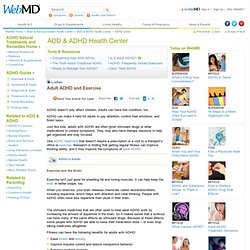
We will provide you with a dropdown of all your saved articles when you are registered and signed in. ADHD doesn't only affect children. Adults can have this condition, too. ADHD can make it hard for adults to pay attention, control their emotions, and finish tasks. Just like kids, adults with ADHD are often given stimulant drugs or other medications to control symptoms. Exercise for Children With ADHD. Why do I need to register or sign in for WebMD to save?
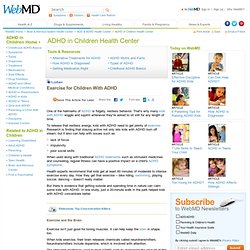
We will provide you with a dropdown of all your saved articles when you are registered and signed in. One of the hallmarks of ADHD is fidgety, restless behavior. That's why many kids with ADHD wiggle and squirm whenever they're asked to sit still for any length of time. To release that restless energy, kids with ADHD need to get plenty of exercise. Research is finding that staying active not only lets kids with ADHD burn off steam, but it also can help with issues such as: lack of focus impulsivity poor social skills When used along with traditional ADHD treatments such as stimulant medicines and counseling, regular fitness can have a positive impact on a child's ADHD symptoms. Health experts recommend that kids get at least 60 minutes of moderate to intense exercise every day. But there is evidence that getting outside and spending time in nature can calm some kids with ADHD.
Continue reading below... Exercise and the Brain. 5 Ways 'Common Sense' Lies To You Everyday. Albert Einstein said common sense is the collection of prejudices acquired by the age of 18.

It is also a result of some pervasive and extremely stupid logical fallacies that have become embedded in the human brain over generations, for one reason or another. These malfunctioning thoughts--several of which you've had already today--are a major cause of everything that's wrong with the world. The Historian's Fallacy. Common sense. Common sense is something which you think you know to be true but that may not actually be true.
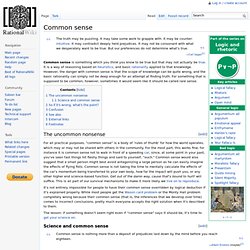
It is a way of reasoning based on heuristics, and basic rationality applied to that knowledge. However, the danger with common sense is that the scope of knowledge can be quite wrong, and the basic rationality can simply not be deep enough for an attempt at finding truth. For something that is supposed to be common, however, sometimes it would seem like it should be called rare sense. [edit] The uncommon nonsense For all practical purposes, "common sense" is a body of 'rules of thumb' for how the world operates, which may or may not be shared with others in the community. It's not entirely impossible for people to have their common sense overridden by logical deduction if it's explained properly. The lesson: if something doesn't seem right even if "common sense" says it should be, it's time to get your science on. [edit] Science and common sense. How to Develop Common Sense: 8 Steps (with Pictures.